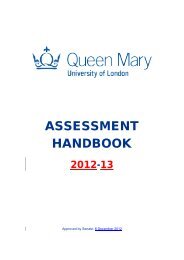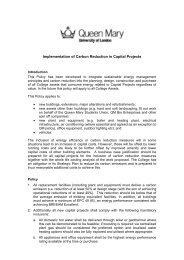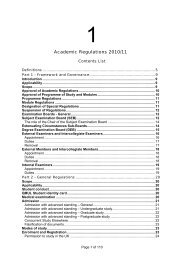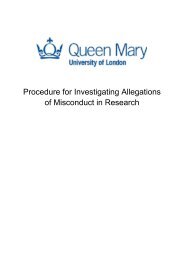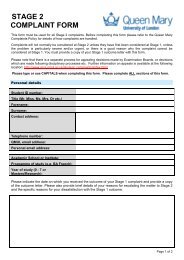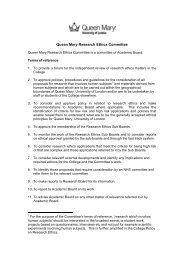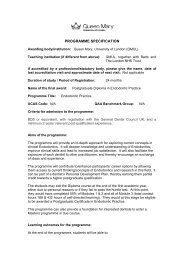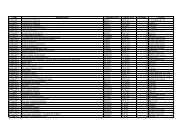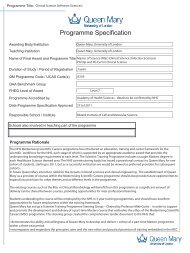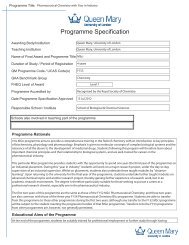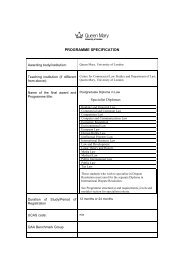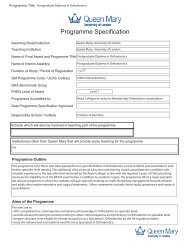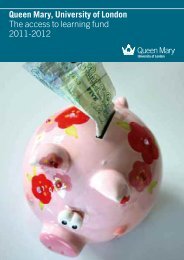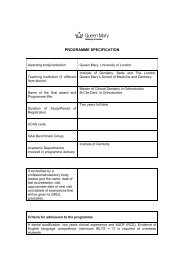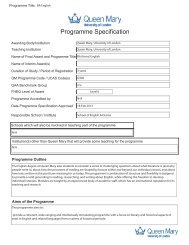BA (Hons) Politics (L202) - Queen Mary, University of London
BA (Hons) Politics (L202) - Queen Mary, University of London
BA (Hons) Politics (L202) - Queen Mary, University of London
Create successful ePaper yourself
Turn your PDF publications into a flip-book with our unique Google optimized e-Paper software.
Programme Title: <strong>BA</strong> <strong>Politics</strong><br />
Programme Specification<br />
Awarding Body/Institution<br />
Teaching Institution<br />
<strong>Queen</strong> <strong>Mary</strong>, <strong>University</strong> <strong>of</strong> <strong>London</strong><br />
<strong>Queen</strong> <strong>Mary</strong>, <strong>University</strong> <strong>of</strong> <strong>London</strong><br />
Name <strong>of</strong> Final Award and Programme Title <strong>BA</strong> <strong>Politics</strong><br />
Name <strong>of</strong> Interim Award(s)<br />
Duration <strong>of</strong> Study / Period <strong>of</strong> Registration<br />
QM Programme Code / UCAS Code(s)<br />
QAA Benchmark Group<br />
3 Years FT<br />
<strong>L202</strong><br />
<strong>Politics</strong> and International Relations<br />
FHEQ Level <strong>of</strong> Award Level 6<br />
Programme Accredited by<br />
na<br />
Date Programme Specification Approved 17 Feb 2012<br />
Responsible School / Institute<br />
School <strong>of</strong> <strong>Politics</strong> and International Relations<br />
Schools which will also be involved in teaching part <strong>of</strong> the programme<br />
Institution(s) other than <strong>Queen</strong> <strong>Mary</strong> that will provide some teaching for the programme<br />
Programme Outline<br />
The programme is designed to provide students with a strong grounding in various aspects <strong>of</strong> Political Studies, including<br />
political theory, political institutions, political practice, comparative politics, political analysis and international politics. The<br />
programme is designed to provide students with a grounding in all <strong>of</strong> these central issues (especially at levels 4 and 5), but at<br />
the same time provide sufficient flexibility to specialise in particular themes, topics and areas if they so wish (especially at level<br />
6, but also to some degree at level 5).<br />
The programme is designed to help students develop a strong sense <strong>of</strong> intellectual integrity, acquire substantial knowledge in<br />
the broad fields <strong>of</strong> <strong>Politics</strong> and apply these skills to wider situations.<br />
Aims <strong>of</strong> the Programme<br />
To:<br />
- Provide students with a coherent, wide-ranging and intellectually stimulating programme including political theory, ideas and<br />
ideologies, government and institutions, public policy, area studies, comparative politics and international relations.<br />
- Introduce students to, and encourage them to employ, a range <strong>of</strong> methodological approaches.
Programme Title: <strong>BA</strong> <strong>Politics</strong><br />
- Enable students to develop independent critical thinking and judgement and to undertake independent research tasks.<br />
- Develop a range <strong>of</strong> skills necessary to the effective communication <strong>of</strong> ideas and arguments.<br />
- Provide a basis for further study in <strong>Politics</strong> or related disciplines.<br />
What Will You Be Expected to Achieve?<br />
Students who successful complete the programme will be able to;<br />
Academic Content:<br />
A 1<br />
A 2<br />
A 3<br />
the nature <strong>of</strong> politics, including a range <strong>of</strong> principles, concepts and terminologies associated with the study <strong>of</strong><br />
political ideas, institutions and behaviour;<br />
historical and contemporary political phenomena, including political texts, issues and problems within the field <strong>of</strong><br />
study;<br />
appropriate theoretical and/or methodological approaches in the field <strong>of</strong> politics<br />
Disciplinary Skills - able to:<br />
B 1<br />
B 2<br />
B 3<br />
demonstrate systematic and critical knowledge and understanding <strong>of</strong> a range <strong>of</strong> principles, concepts and<br />
terminologies associated with the study <strong>of</strong> politics;<br />
apply knowledge and understanding, selecting and using established techniques and a range <strong>of</strong> sources to evaluate<br />
political texts, issues and problems;<br />
select appropriate theoretical and/or methodological approaches to a range <strong>of</strong> issues within the field <strong>of</strong> study<br />
Attributes:<br />
C 1<br />
C 2<br />
C 3<br />
C 4<br />
C 5<br />
C 6<br />
identify and critically evaluate appropriate information in specific contexts in a self-directed way, and reflect on how<br />
this might be used and adapted to different contexts;<br />
work independently, demonstrating clarity, initiative, self organisation and time management;<br />
establish a skills and learning agenda through negotiation, participation and communication in group discussions.<br />
develop a reasoned argument and synthesise information, and communicate this clearly and effectively;<br />
elect and use information, including from IT sources;<br />
exercise critical judgement and self-reflection on their own learning, and to use this to adapt to new situataions in<br />
pr<strong>of</strong>essional settings<br />
How Will You Learn?<br />
The programme is taught in accordance with the School's Teaching and Learning Strategy. The School is committed to<br />
developing, maintaining and supporting good and innovative teaching practice, and to fostering independent learning and
Programme Title: <strong>BA</strong> <strong>Politics</strong><br />
critical thinking in our students. Our strategy is informed by the overall framework set out in the College Teaching and Learning<br />
Strategy 2006-9, and within this we consider the following areas to be <strong>of</strong> central strategic importance:<br />
Teaching takes a number <strong>of</strong> forms:<br />
- lecture<br />
- seminars<br />
- workshops<br />
- guest speakers<br />
- individual supervision <strong>of</strong> projects and dissertations<br />
- individual feedback on written work (where requested)<br />
Learning is supported by:<br />
- Coherently designed and effectively delivered modules<br />
- Detailed module handbooks, providing learning outcomes and guided reading for each module<br />
- The provision <strong>of</strong> key materials in libraries or through electronic resources<br />
- Appropriate assessment exercises within each module<br />
- Use <strong>of</strong> electronic teaching materials including Powerpoint, WebCT and online reading lists<br />
- Encouraging active participation by students in seminar discussions<br />
- Research methods training<br />
How Will You Be Assessed?<br />
Assessment is varied and takes a number <strong>of</strong> forms within the programme. The nature <strong>of</strong> the assessment is closely connected to<br />
the desired learning outcomes and the mode <strong>of</strong> teaching within each module. Forms <strong>of</strong> assessment include:<br />
- Unseen examinations<br />
- Critical essays<br />
- Research projects<br />
- Project synopses<br />
- Student presentations<br />
- Literature reviews<br />
How is the Programme Structured?<br />
Year 1 (Level 4)<br />
As with all the degree programmes in the department, the <strong>BA</strong> in <strong>Politics</strong> is taught within the academic credit framework system.<br />
In the first year students take three compulsory modules in <strong>Politics</strong>, which provide a grounding in key aspects <strong>of</strong> the study <strong>of</strong><br />
politics:<br />
• POL100 Introduction to <strong>Politics</strong>– 30 credits<br />
• POL103 Comparative Government and <strong>Politics</strong>– 30 credits<br />
• POL105 Political analysis– 30 credits<br />
• Either POL106 International Relations or 30 credits from other Schools, in modules appropriate to the field <strong>of</strong> study.<br />
In order to progress from year one to year two, students must take modules to value <strong>of</strong> 120 credit points and pass modules to the<br />
value <strong>of</strong> 90 credit points at academic level 4 or above.<br />
Year 2 (Level 5)<br />
In the second year all students must take the module POL206 Modern Political Thought (worth 30 credits)*, which familiarises<br />
students with the texts <strong>of</strong> key political thinkers, and develops textual analysis skills. In addition, students must take at least one<br />
(30 credit) module from the following three (30 credit) modules; POL245 Theories <strong>of</strong> State, Economy and Society (30 credits),<br />
POL243 British <strong>Politics</strong> (30 credits) and POL246 Representative Democracy in Practice (30 credits).
Programme Title: <strong>BA</strong> <strong>Politics</strong><br />
Students can also choose from the other second year modules POL240 International Relations: Theories and Contemporary<br />
Issues, POL242 Global Governance (30 credits), POL244 International <strong>Politics</strong> <strong>of</strong> the Developing World (30 credits), and POL241<br />
War and Security in World <strong>Politics</strong> (30 credits).<br />
* Where a student is unable to take the compulsory module at the normal point due to an approved study abroad period, the<br />
student may instead take the required modules at the next available opportunity.<br />
Through meetings with advisers, students are supported in their module choices, and helped to develop a cognate programme<br />
<strong>of</strong> study. This approach is sufficiently prescriptive to support the idea that there are certain key things that all <strong>Politics</strong> students<br />
need to study, but also flexible enough to enable students to pursue their studies in accordance with their developing<br />
intellectual interests. Students may also select 30 credits from other Schools, in modules appropriate to the field <strong>of</strong> study.<br />
In order to progress from year two to year three, students must have taken modules to the value <strong>of</strong> 240 credit points across years<br />
one and two and passed modules to the value <strong>of</strong> 180 credit points, where at least 90 credit points are at level 5 and no more than<br />
150 credit points at level 4.<br />
Year 3 (Level 6)<br />
In the final year students undertake a self-designed research project worth 30 credits, along with modules worth 90 credits from<br />
across the range <strong>of</strong> modules provided by the department.* POL310 The Research Project is a 12,000 maximum word dissertation,<br />
and students are provided with one-to-one supervision, additionally supported by a programme <strong>of</strong> dissertation workshops. All<br />
module choices are made with the guidance <strong>of</strong> the student’s personal adviser in the department. Level 6 is designed to allow<br />
students to specialise in areas <strong>of</strong> specific interests, both in their dissertation topic and their module choices. Students may also<br />
select 30 credits from other Schools, in modules appropriate to the field <strong>of</strong> study.<br />
*level 6 15 credit modules can be <strong>of</strong>fered in either semester to cover sabbatical leave and ensure an even provision across both<br />
semesters.<br />
In order get the degree award <strong>of</strong> <strong>BA</strong> (<strong>Hons</strong>) <strong>Politics</strong>, students must have taken modules to the value <strong>of</strong> 360 credit points across<br />
years one, two and three and passed modules to the value <strong>of</strong> 270 credit points, where at least 90 credit points are at level 6 and<br />
no more than 150 credit points at level 4.<br />
Academic Year <strong>of</strong> Study<br />
Module Title<br />
Module<br />
Code<br />
Credits<br />
Level<br />
Module<br />
Selection<br />
Status<br />
Academic<br />
Year <strong>of</strong><br />
Study<br />
Semester<br />
Introduction to <strong>Politics</strong> POL100 30 4 Compulsory 1 Semesters 1& 2<br />
Comparative Government and <strong>Politics</strong> POL103 30 4 Compulsory 1 Semesters 1 & 2<br />
Political Analysis POL105 30 4 Compulsory 1 Semesters 1 & 2<br />
Introduction to International Relations POL106 30 4 Elective 1 Semesters 1 & 2<br />
Modern Political Thought POL206 30 5 Compulsory 2 Semesters 1 & 2<br />
International Relations: Theories and<br />
Contemporary Issues<br />
POL240 30 5 Elective 2 Semesters 1 & 2
Programme Title: <strong>BA</strong> <strong>Politics</strong><br />
Module Title<br />
Module<br />
Code<br />
Credits<br />
Level<br />
Module<br />
Selection<br />
Status<br />
Academic<br />
Year <strong>of</strong><br />
Study<br />
Semester<br />
War and Security in World <strong>Politics</strong> POL241 30 5 Elective 2 Semesters 1 & 2<br />
International <strong>Politics</strong> <strong>of</strong> the Developing<br />
World<br />
POL244 30 5 Elective 2 Semesters 1 & 2<br />
Global Governance POL242 30 5 Elective 2 Semesters 1 & 2<br />
British <strong>Politics</strong> POL243 30 5 Elective 2 Semesters 1 & 2<br />
Representative Democracy in Practice POL245 30 5 Elective 2 Semesters 1 & 2<br />
Theories <strong>of</strong> State, Economy and Society POL246 30 5 Elective 2 Semesters 1 & 2<br />
<strong>Politics</strong> Research Project POL310 30 6 Compulsory 3 Semesters 1 & 2<br />
Ideology and Political Critique POL308 15 6 Elective 3 Semesters 1 / 2<br />
European Integration and the EU as a<br />
Political System<br />
POL330 30 6 Elective 3 Semesters 1 & 2<br />
French <strong>Politics</strong> POL333 15 6 Elective 3 Semesters 1 / 2<br />
The <strong>Politics</strong> <strong>of</strong> Economic Ideas POL337 15 6 Elective 3 Semesters 1 / 2<br />
Select Topics in British <strong>Politics</strong> I POL352 15 6 Elective 3 Semesters 1 / 2<br />
Select Topics in British <strong>Politics</strong> I POL353 15 6 Elective 3 Semesters 1 / 2<br />
Globalisation: Issues and Debate POL355 15 6 Elective 3 Semesters 1 / 2<br />
US Foreign Policy POL358 15 6 Elective 3 Semesters 1 / 2<br />
Gender and <strong>Politics</strong> POL361 15 6 Elective 3 Semesters 1 / 2<br />
Electoral Behaviour POL325 15 6 Elective 3 Semesters 1 / 2<br />
Theories <strong>of</strong> the Self POL326 15 6 Elective 3 Semesters 1 / 2<br />
Analysing Public Policy POL350 15 6 Elective 3 Semesters 1 / 2
Programme Title: <strong>BA</strong> <strong>Politics</strong><br />
Module Title<br />
Module<br />
Code<br />
Credits<br />
Level<br />
Module<br />
Selection<br />
Status<br />
Academic<br />
Year <strong>of</strong><br />
Study<br />
Semester<br />
Post-Colonial <strong>Politics</strong> <strong>of</strong> the Middle East POL365 15 6 Elective 3 Semesters 1 / 2<br />
Case Studies in Ethnic Conflict:<br />
Northern Ireland<br />
<strong>Politics</strong> o the New Left: Ideas, Practice<br />
and Legacy<br />
Theory and Practice in Environmental<br />
<strong>Politics</strong><br />
POL322 15 6 Elective 3 Semesters 1 / 2<br />
POL344 15 6 Elective 3 Semesters 1 / 2<br />
POL345 15 6 Elective 3 Semesters 1 / 2<br />
Civil Society: Theory and Practice POL348 15 6 Elective 3 Semesters 1 / 2<br />
European <strong>Politics</strong>: National Identity and<br />
Ethnicity<br />
POL351 15 6 Elective 3 Semesters 1 / 2<br />
Theories <strong>of</strong> Radical Democracy POL357 15 6 Elective 3 Semesters 1 / 2<br />
Resistance, Revolutionary Change and<br />
World <strong>Politics</strong><br />
POL359 15 6 Elective 3 Semesters 1 / 2<br />
Political Parties and Party Systems POL360 15 6 Elective 3 Semesters 1 / 2<br />
Contemporary Political Theory: Issue<br />
and Approaches<br />
POL366 15 6 Elective 3 Semesters 1 / 2<br />
Marxism and World <strong>Politics</strong> POL367 15 6 Elective 3 Semesters 1 / 2<br />
Socialist Political Thought POL368 15 6 Elective 3 Semesters 1 / 2<br />
Latin American <strong>Politics</strong> POL369 15 6 Elective 3 Semesters 1 / 2<br />
20th Century Political Thought POL370 15 6 Elective 3 Semesters 1 / 2<br />
What Are the Entry Requirements?<br />
The School considers each candidate individually and conducts admissions interviews.<br />
We typically require a 360 points from 3 A2s.<br />
We welcome well-motivated candidates with non-standard qualifications, including overseas and mature students.
Programme Title: <strong>BA</strong> <strong>Politics</strong><br />
How Do We Listen and Act on Your Feedback?<br />
The Staff-Student Liaison Committee provides a formal means <strong>of</strong> communication and discussion between the School and its<br />
students. The committee consists <strong>of</strong> student representatives from each year in the School together with appropriate<br />
representation from staff within the School. It is designed to respond to the needs <strong>of</strong> students, as well as act as a forum for<br />
discussing programme and module developments. The Staff-Student Liaison Committees meet regularly throughout the year.<br />
The School also has a Learning and Teaching Committee, which advises the Colleagues on all matters relating to the delivery <strong>of</strong><br />
taught programmes within the School including monitoring the application <strong>of</strong> relevant QM policies and reviewing all proposals<br />
for module and programme approval and amendment before submission to Taught Programmes Board. Student representative<br />
are also present at this Committee’s .<br />
The School operate an Annual Programme Review <strong>of</strong> its taught undergraduate and postgraduate provision. The process is<br />
organised at School-level with the Head <strong>of</strong> School responsible for the completion <strong>of</strong> the school's Annual Programme Reviews.<br />
Schools are required to produce a separate Annual Programme Review for undergraduate programmes and for postgraduate<br />
taught programmes using the relevant Undergraduate or Postgraduate Annual Programme Review pro-forma. Students’ views<br />
are considered in this process through analysis <strong>of</strong> the NSS and individual module evaluations.<br />
Academic Support<br />
The School runs induction and welcome back meetings at the start <strong>of</strong> each semester, to update students on School/QM policies<br />
and advise them on studies.<br />
Each student is assigned a dedicated Personal Adviser throughout their years <strong>of</strong> study to assist them in choosing their modules<br />
and advising them on their studies. The School has 1st, 2nd and Final year dedicated Senior Tutors to deal with Extenuating<br />
Circumstances, the Senior Tutors are assisted by the Student Support Manager.<br />
To assist with their final year project students are assigned a superviser whose research matches the topic/subject they wish to<br />
focus on.<br />
Programme-specific Rules and Facts<br />
NA<br />
Specific Support for Disabled Students<br />
<strong>Queen</strong> <strong>Mary</strong> has a central Disability and Dyslexia Service (DDS) that <strong>of</strong>fers support for all students with disabilities, specific<br />
learning difficulties and mental health issues. The DDS supports all <strong>Queen</strong> <strong>Mary</strong> students: full-time, part-time, undergraduate,<br />
postgraduate, UK and international at all campuses and all sites.<br />
Students can access advice, guidance and support in the following areas:<br />
• Finding out if you have a specific learning difficulty like dyslexia<br />
• Applying for funding through the Disabled Students' Allowance (DSA)<br />
• Arranging DSA assessments <strong>of</strong> need<br />
• Special arrangements in examinations<br />
• Accessing loaned equipment (e.g. digital recorders)<br />
• Specialist one-to-one "study skills" tuition<br />
• Ensuring access to course materials in alternative formats (e.g. Braille)<br />
• Providing educational support workers (e.g. note-takers, readers, library assistants)<br />
• Mentoring support for students with mental health issues and conditions on the autistic spectrum.
Programme Title: <strong>BA</strong> <strong>Politics</strong><br />
Links With Employers, Placement Opportunities and Transferable Skills<br />
The <strong>BA</strong> (<strong>Hons</strong>) <strong>Politics</strong> programme is not connected to a particular employment path and the department does not have links<br />
with a particular set <strong>of</strong> potential employers. However the subject specific and generic skills that are generated by the<br />
programme’s learning outcomes prepare students for a wide range <strong>of</strong> employment opportunities. By providing a coherent and<br />
thorough overview <strong>of</strong> the discipline <strong>of</strong> politics, students are prepared for politics-related careers such as the civil service,<br />
journalism, political research, social work, local government and working for a non-governmental organisation. More broadly, the<br />
emphasis on written and oral communication in the degree, along with the critical and analytical approaches to problem-solving,<br />
equip students for a wide variety <strong>of</strong> careers, including finance and banking, management training, PR and advertising. By<br />
providing a robust academic grounding in the subject students can also progress into higher levels <strong>of</strong> study, including MSc and<br />
research degreess, and pr<strong>of</strong>essional qualifications in law and teaching.<br />
Programme Specification Approval<br />
Person completing Programme Specification<br />
Pr<strong>of</strong>essor Ray Kiely<br />
Person responsible for management <strong>of</strong> programme Pr<strong>of</strong>essor Ray Kiely<br />
Date Programme Specification produced/amended<br />
by School Learning and Teaching Committee<br />
Date Programme Specification approved by<br />
Taught Programmes Board<br />
25th Jan 2012<br />
17 Feb 2012



